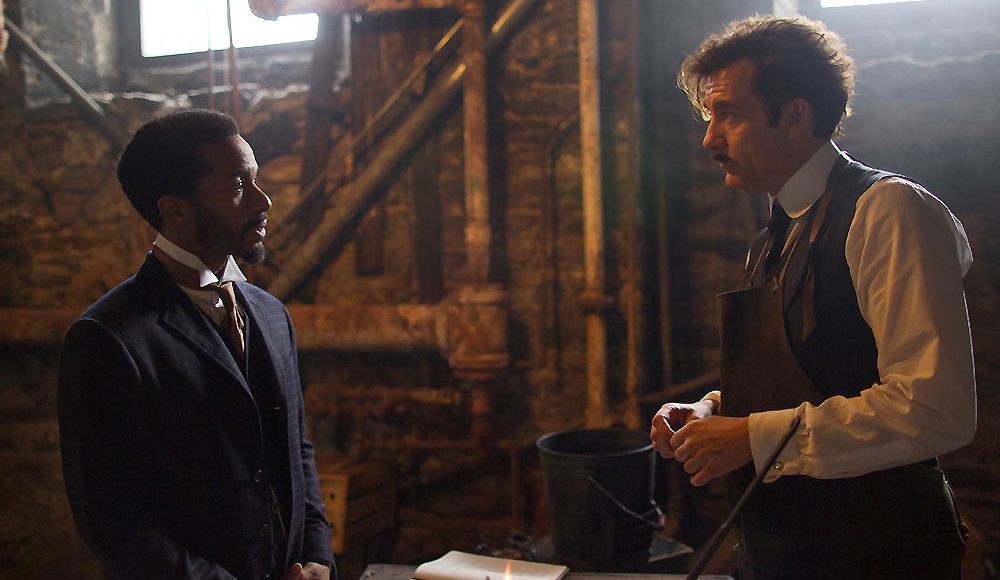Mrs. Elizabeth Handy, wife to the “Father of the Blues” W. C. Handy, lay critically ill on the street outside the doors of the Knickerbocker Hospital while the staff debated whether or not she should be admitted, her being a Negro and all. A financial compromise was reached when Handy forked over $36.00 for a $6.00 room. The negotiations took five minutes shy of an hour. Elizabeth Handy died two hours after being admitted. It was March 11, 1937.
Truth mirrors fiction in so many ways in the Steven Soderbergh directed series, The Knick which takes place a mere 37 years earlier. In 1900 Harlem, racism, fraud, ambulance shenanigans, drug abuse and bribery were all just business as usual.
Cinemax’s new medical drama, (‘The Knick’ is short for Knickerbocker) is a fictionalized version of the once vibrant, now closed Manhattan hospital say series creator-writers Jack Amiel and Michael Begler. The historical facts, however, are close enough to reality to make for some mighty uncomfortable viewing moments. All of the surgeries, for example, are based on actual operations. They’re up close and clinically personal, so beware.
In this audio clip, Amiel and Begler talk about the importance of writing truth into fiction:
[soundcloud url=”https://api.soundcloud.com/tracks/161867263″ params=”auto_play=false&hide_related=false&show_comments=true&show_user=true&show_reposts=false&visual=true” width=”100%” height=”450″ iframe=”true” /]
Dr. John Thackery (Clive Owen) a brilliant surgeon, is the newly appointed head at The Knick. Following in the footsteps of his mentor and close friend, he is very ready to shoulder the responsibilities the position demands: though being innovative often means racking up more deaths than lives

André Holland, a brilliant surgeon on the rise in ‘The Knick’ (Photo by Mary Cybulski – Courtesy of Cinemax)
saved. Still, he pushes beyond all boundaries to achieve his goals, to the detriment of his health and at times, it seems, his sanity. He finds alternative ways to cope.
Joining him in the fray is an equally gifted surgeon Dr. Algernon Edwards (André Holland); a graduate of Harvard, he is recently returned from London and Paris where he practiced without prejudice under renowned surgeons.
“I’m beginning to think you were not told everything about me,” Edwards says when he is met with an abrupt rudeness by Thackery. “You envisioned something different. Something lighter.”
“I did,” Thackery rejoins unapologetically.
Edwards is not one to take slights or slurs lightly and determines to return to Boston as soon as possible.
Once he witnesses Thackery’s surgical genius firsthand however, Edwards decides to stay to learn from him, even though, he later confides to his friend and benefactress: “I may be better than he is.” Yet, he has learned the value in biding one’s time and staying prepared. Far from shy, he is studiously bold and when an opportunity does open up, he strikes with no hesitation.
This all takes place during a time when experimentation was high, but oversight was not. Rules were blatantly stretched if not outright broken. Amiel and Begler point out that many doctors used drugs to get through the day. Some, most notably William Halsted a co-founder of Johns Hopkins: “…he was taking cocaine to do his job and to progress medicine,” said Begler at a recent press Q&A. “But he also needed to come down and needed to balance that, and his drug of choice was morphine.” Doctor Thackery visits Chinese opium dens at night.
From the outset, it’s not easy figuring out Thackery’s motives. It is clear that there is a burning—an inner compulsion propelling him forward at an unforgivable pace. Is he all about making inroads to do good…? To be the General in the war against disease or injury that would maim or kill his patients? Is he trying to achieve a sort of superhuman reputation as being the best of the best in his field? Money doesn’t appear to drive him. It’s unclear exactly what does.

Eric Johnson, Eve Hewsen, Clive Owen in ‘The Knick’ Surgery (Photo by Mary Cybulski – Courtesy of Cinemax)
Season 1, Episode 1—The Wrap Up: A period medical drama that feels so real it’s like taking a walk back in time. Filming on location in and around Manhattan and Brooklyn was magic and it shows on screen in the production design by Howard Cummings, which is unbelievably authentic. The period wardrobing by costume designer Ellen Mirojnick? Meticulous.
This is a drama that lends historical context to a certain period in America hidden under the veil of entertainment. The writing is superb and Soderbergh’s directing (he did all 10 Season 1 episodes) is tight. Cinemax ordered up The Knick for a second season while still a month out from debuting. There’s a leap of faith you can bet on.
Both Owen, who is also executive producing, and Holland are an opposing pair who give as good as they get. Holland has an unclear path ahead of him as he navigates these muddy waters of racial stereotypes; among both races, white and black. May turn out that his story is even more interesting than that of Thackery, demon head of surgery.
Supporting the two leads are a fine group: Jeremy Bobb is Herman Barrow, Juliet Rylance is Cornelia Robertson, Eve Hewson is Lucy Elkins, Michael Angarano is Dr. Bertram “Bertie” Chickering, Jr., Chris Sullivan is Tom Cleary, Cara Seymour is Sister Harriet, Eric Johnson is Dr. Everett Gallinger, David Fierro is Jacob Speight, Matt Frewer is Dr. J. M. Christiansen
Be the first in line for ‘The Knick’ debuting Friday, August 8 —10pm ET/PT. Bound to be on a best of summer list.
(A TV Review)





